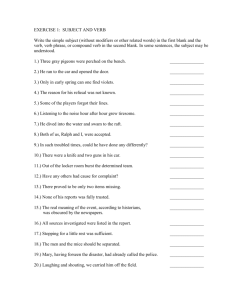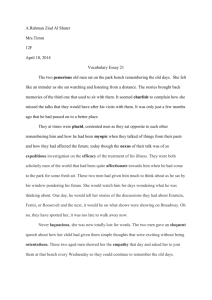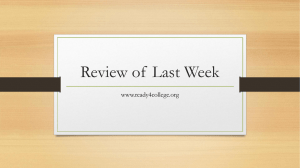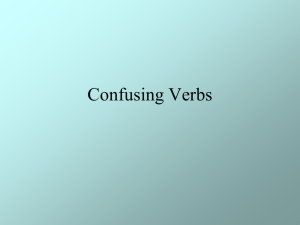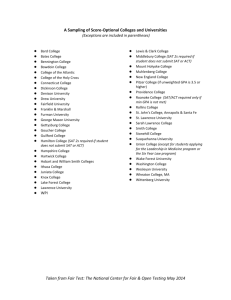EXERCISE 1: SUBJECT AND VERB
advertisement
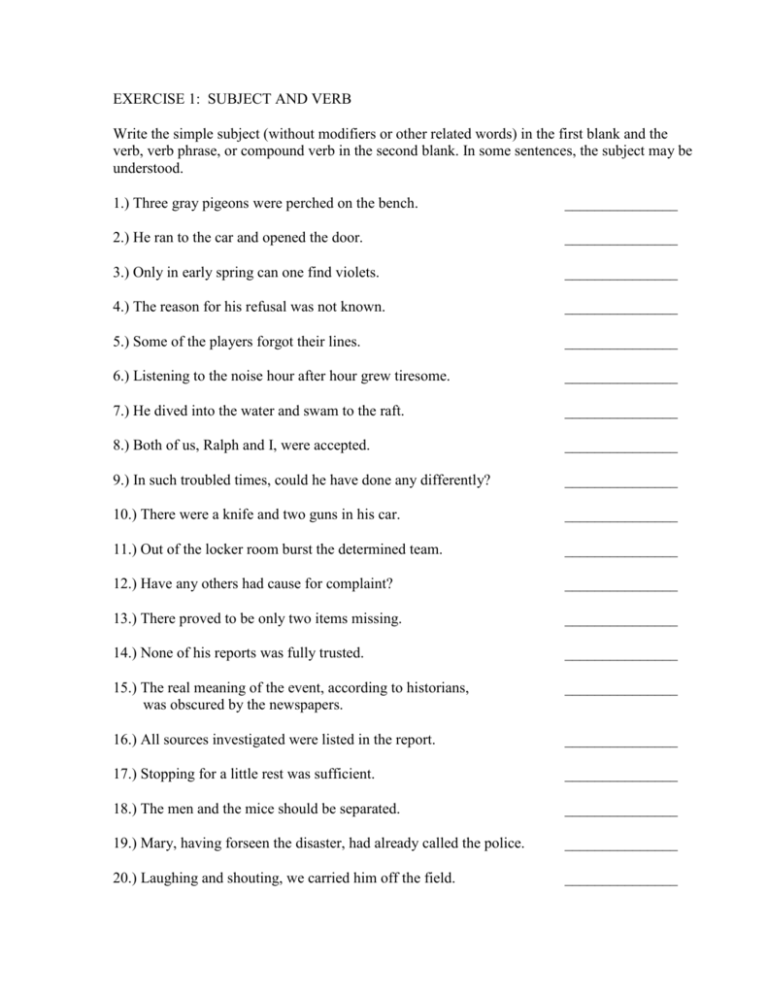
EXERCISE 1: SUBJECT AND VERB Write the simple subject (without modifiers or other related words) in the first blank and the verb, verb phrase, or compound verb in the second blank. In some sentences, the subject may be understood. 1.) Three gray pigeons were perched on the bench. _______________ 2.) He ran to the car and opened the door. _______________ 3.) Only in early spring can one find violets. _______________ 4.) The reason for his refusal was not known. _______________ 5.) Some of the players forgot their lines. _______________ 6.) Listening to the noise hour after hour grew tiresome. _______________ 7.) He dived into the water and swam to the raft. _______________ 8.) Both of us, Ralph and I, were accepted. _______________ 9.) In such troubled times, could he have done any differently? _______________ 10.) There were a knife and two guns in his car. _______________ 11.) Out of the locker room burst the determined team. _______________ 12.) Have any others had cause for complaint? _______________ 13.) There proved to be only two items missing. _______________ 14.) None of his reports was fully trusted. _______________ 15.) The real meaning of the event, according to historians, was obscured by the newspapers. _______________ 16.) All sources investigated were listed in the report. _______________ 17.) Stopping for a little rest was sufficient. _______________ 18.) The men and the mice should be separated. _______________ 19.) Mary, having forseen the disaster, had already called the police. _______________ 20.) Laughing and shouting, we carried him off the field. _______________ 21.) Here are the necessary tools. _______________ 22.) These are the best tools available. _______________ 23.) But Joe, unwilling to hurt anyone, refused to fight. _______________ 24.) The size of the desert and the desolation awed me. _______________ 25.) In spite of all our pleading, he resigned as president. _______________ EXERCISE 2 : KINDS OF SENTENCES Classify the following sentences by using the appropriate abbreviation. S – Simple Cplex – Complex Cpd – Compound CC – Compound-Complex 1.) I read the book in two hours, for it was short. _______________ 2.) I read the book in two hours because it was short. _______________ 3.) I read the book in two hours because of its shortness. _______________ 4.) Bill rowed and I bailed water. _______________ 5.) He asked when we would arrive and when we would leave. _______________ 6.) Whom were you talking about? _______________ 7.) The man whom we wanted had moved away. _______________ 8.) We had to gather leaves, mount them in notebooks, identify them and label them. _______________ 9.) By the third week we had grown weary of his nagging and had resolved to put it to an end. _______________ 10.) After searching for three hours, we came upon the camp and found the others waiting for us. _______________ 11.) After we searched for three hours, we came upon the camp, where we found the others waiting for us. _______________ 12.) After we searched for three hours, we came upon the camp, and there we found the others waiting for us. _______________ 13.) Climbing the mountain was difficult, but the view from the top was worth it. _______________ 14.) The trail was dangerous, and so we moved slowly and carefully. _______________ 15.) The trail was so dangerous that we had to move slowly and carefully. _______________ 16.) The danger of the trail forced us to move slowly and carefully. _______________ 17.) Although the mountain was steep, Jack climbed slowly _______________ upward, and I followed. 18.) It was getting dark, but we pressed on. _______________ 19.) In spite of the dark, we pressed on. _______________ 20.) Although it was getting dark, we pressed on. _______________ EXERCISE 3: SENTENCE FRAGMENTS Each of the following paragraphs contains one fragment. Write its number in the blank below the paragraph. 1. (1) History as taught by Professor Hartfield was a dull subject. (2) Innumerable dates, innumerable names, numbers killed in battles, and so on, all to be memorized. (3) Quite otherwise was the interest in Professor Speck’s class. (4) The analysis of broad trends and the application of lessons from the past to the current scene were his main interests. ________ 2. (1) In our dean of men’s judgment, in such cases, I have complete confidence. (2) All the witnesses are allowed to testify at length and without interruption. (3) Irrelevancies are pointed out. (4) Then comes his decision. (5) Calm, impartial, just, and with no regard at all to the student’s previous record. ________ 3. (1) Now his goals had been reached. (2) A fine home, a steady and large income, and more than adequate reserves to meet unexpected calls on his reserves. (3) Yet there was a growing uneasiness. (4) What of the future? (5) Was material security in itself sufficient for happiness? ________ 4. (1) In modern big business the accountant plays a tremendously important role. (2) Keeping down costs of manufacturing, for example, and helping in making financial decisions are some of his tasks. (3) Compare such work with tasks assigned to the accountant in former years. (4) Checking on the accuracy of records was his major task. (5) Balancing debits and credits, auditing cash accounts, and so one, but also making the yearly financial statements. ________ 5. (1) He knew that this was to be the final meeting. (2) They realized it too. (3) There they were. (4) Those who had supported him, those who had opposed him, and those who had played it safe. (5)Somehow it did not seem to matter now—their loyalty or their disloyalty. ________ 6. (1) Essentially they are alike. (2) Motors, transmissions, and bodies follow similar designs. (3) Features of greater comfort in one are offset by comparable features in the others. (4) Yet one outsells the others by far. (5) The explanation lying chiefly in external aspects of style and color that promote neither greater safety nor superior performance. ________ 7. (1) In retrospect it seems odd that certain manufacturers could not anticipate any drastic changes in the demands for their products. (2) Such companies as those that manufactured kerosene lamps, horse drawn vehicles, and streetcars. (3) They failed to diversify and to seek new products. (4) Stubbornly they persevered. (5) And bankruptcy followed. ________ 8. (1) Certainly that curriculum was well planned to give me a command of the fundamental principles of engineering. (2) There was no doubt that after graduation I would be able to earn a good salary. (3) Certain grave doubts, nevertheless, persisted. (4) Because education should mean more than a preparation for earning a living. (5) I therefore sought a curriculum that was not quite so technical in requirements. ________ 9. (1) My favorites in poets seem almost old-fashioned today. (2) I like authors who communicate easily with persons of average intelligence and knowledge. (3)Clarity of language, clarity of thought, and lines that are not excessively allusive or symbolic. (4) Wordsworth and Robert Frost, for example, give me great pleasure. (5) And I turn to poetry for pleasure, not for puzzles. ________ 10. (1) What guides voters in their choice of candidates has been my study of late. (2) Party loyalties, of course, guide some. (3) Others are influenced on the stands candidates take on issues. (4) But how many are influenced by irrelevancies! (5) The toothpaste smile, the pious platitude, the solemn and vague generalizations! ________ EXERCISE 4: COMMA SPLICE AND RUN-0N SENTENCES Write the appropriate abbreviation in the blank to the right. CS – Comma Splice RO – Run On C – Correct Punctuation 1. He agreed with the main points of the theme the lack of clear organization annoyed him. ________ 2. H agreed with the main points of the theme, the lack of clear organization annoyed him. ________ 3. He agreed with the main points of the theme, however, the lack of clear organization annoyed him. ________ 4. He agreed with the main points of the theme; however, the lack of clear organization annoyed him. ________ 5. He agreed with the main points of the theme, but the lack of clear organization annoyed him. ________ 6. In questions of grammar Professor Smith was permissive, but Professor Thompson is inclined to be authoritative. ________ 7. I like the permissive viewpoint, nevertheless it can be carried too far. ________ 8. The fact that certain usages are common does not necessarily make them desirable. ________ 9. Consider what would happen if we adopted the extremely permissive approach to morals, we would have chaos. ________ 10. On the other hand, describing certain usages as wrong even though good writers regularly employ them is illogical. ________ 11. Both Tennyson and Browning used a great variety of styles, nevertheless their poems are always distinctively their own. ________ 12. A few of Tennyson’s poems are somewhat effeminate, rugged strength characterizes many of the best. ________ 13. Having learned that a symphony often led to true appreciation, I decided that King Lear merited several re-readings. ________ 14. It worked, I am beginning to appreciate the great power of the play. ________ 15. For a time I listened to myself talk, I speedily stopped making certain ________ errors. 16. I love that poem, it’s the best he ever wrote. ________ 17. All the major items of business having been disposed of, we decided to postpone the others and adjourn. ________ 18. They scored again after that we had no hope. ________ 19. In his later year Wordsworth lost his power, in fact I find the last poems dull. ________ 20. He then transferred to this college, where he found an entirely different atmosphere. ________ EXERCISE 5: VERB FORMS In the blank below the sentence put the correct form of the verbs in parentheses. 1. Too many have (begin) to believe that such laws may be (break) with impunity. _____________________ 2. Despite the referee’s warnings, he had (throw) punches after the bell had (ring). _____________________ 3. Despite the bitterness with which he had (speak), I refused to be (draw) into an argument. _____________________ 4. The boat could not have (sink); the entire lake was (freeze). _____________________ 5. The boat has (spring) a leak, and all of them had jumped out and (swim) to shore. _____________________ 6. The storm had (blow) down all the pines in 1960, but by 1968 some of the new pines had already (grow) tall. _____________________ 7. He grabbed the bully and (shake) him as hard as the bully had (shake) the child. _____________________ 8. The letters I had (write) him gave detailed instructions, but he had not (take) my advice. _____________________ 9. I have (know) the time when he would have immediately (spring) to my defense. _____________________ 10. We have (take) all your warnings into consideration, but we have not (shrink) from our duty. _____________________ 11. The songs we (sing) are seldom (sing) today. _____________________ 12. Before he had (swim) a few yards, he (come) to realize how dangerous the waters were. _____________________ 13. “For he on honey-dew hath fed, And (drink) the milk of Paradise.” _____________________ EXERCISE 6: SET, SIT; RAISE, RISE; LAY, LIE Fill in the blanks. 1. I could not get the print to (lie, lay) flat on the table. ______ 2. He (sits, sets) high prices on his merchandise. ______ 3. The moon had (raised, rose, risen) early. ______ 4. The mother had (sat, set) up all night with her sick child. ______ 5. If the water (raises, rises) higher we shall leave. ______ 6. We had (laid, lain, layed) a brick walk. ______ 7. How can he (sit, set) in that rocker so long? ______ 8. He (rose, raised) to his feet in one swift movement. ______ 9. Many have (rose, risen) to such positions from even humbler backgrounds. ______ 10. We had (rose, risen) before dawn. ______ 11. You should have done it before you (set, sat) down. ______ 12. (Sit, set) it here. ______ 13. It must be done before the cake begins to (rise, raise). ______ 14. Several of the members had already (rose, risen) to their feet. ______ 15. He (laid, lay) there for almost four hours. ______ 16. (Set, Sit) still until I tell you to rise. ______ 17. I had (laid, layed, lain) out the exact route to be followed. ______ 18. He had not (raised, rose) the slightest objection. ______ 19. She fell on the couch and (lay, laid) there sobbing. ______ 20. (Sit, Set) you own house in order first. ______ EXERCISE 7: SUBJECT AND VERB AGREEMENT Fill in the blanks. 1. The chief obstacle (was, were) the amendments to the bill. ______ 2. Staring at us through the window were the twins. ______ 3. Either you or she (is, are) to be responsible for the sound effects. ______ 4. A synthesis of these points (is, are) needed. ______ 5. The superior junior or senior (does, do) not need all these regulations. ______ 6. His chief target (is, are) the trustees. ______ 7. Not every one of Shakespeare’s plays (is, are) suitable for study in high school. ______ 8. Interest and understanding, not memorizing, (is, are) what he stresses. ______ 9. The guide, as well as we boys, (was, were) aware of the dangers. ______ 10. In the drawer (was, were) the original manuscript and the notes. ______ 11. Time and tide (waits, wait) for no person. ______ 12. Neither of the candidates (expects, expect) to win easily. ______ 13. Everyone on the committee (receives, receive) copies of the minutes. ______ 14. The biographical details (was, were) the part I liked the least. ______ 15. (Does, Do) either of the suggested solutions really meet the objections raised? ______ 16. There (is, are) prerequisites for this course. ______ 17. The great variety of answers received (suggests, suggest) that the question was poorly framed. ______ 18. Neither the foreman nor the workers (likes, like) the new arrangement. ______ 19. Neither the workers nor the foreman (likes, like) the new arrangement. ______ 20. My explanation for these discrepancies (was, were) the contradictions in the directions. ______ EXERCISE 8: PRONOUN CASE Fill in the blanks. 1. They want two of us, you and (I, me) to police the grounds. ______ 2. Wordsworth was the poet (who, whom) I believe Mill admired most. ______ 3. Our ancestors felt closer to their leaders than (we, us). ______ 4. Was it (she, her) whom you had reference to? ______ 5. (Him, He) and the sergeant-at-arms were the ones who were the most obnoxious. ______ 6. She criticized the two of us—Cynthia and (I, me). ______ 7. (Who, Whom) shall we select for such a dangerous assignment. ______ 8. Since the others are reluctant, let’s you and (I, me) ask him. ______ 9. Though he is older, in this field he has had less experience than (I, me). ______ 10. (We, us) foreigners find the spelling of English very difficult. ______ 11. I shall cooperate with (whoever, whomever) you select as chairman. ______ 12. Are we positive that he is the one (who, whom) we want to lead us? ______ 13. It is desirable that we persuade Elizabeth and (she, her) to cooperate. ______ 14. They needed (we, us) experienced men to help explain the situation. ______ 15. I could never be as unconcerned about such matters as (he, him). ______ 16. Three foremen—Smith, you, and (I, me)—are to be laid off. ______ 17. The dramatist (who, whom) I believe Shakespeare was imitating was Marlowe. ______ 18. I shall go with (whoever, whomever) comes first. ______ 19. All three of them—Thompson, Crane, and (he, him)—are capable men. ______ 20. When I saw Nancy and (they, them) whispering to each other, I suspected the worst. ______ EXERCISE 9: PRONOUN AND ANTECEDENT AGREEMENT Fill in the blanks. 1. The three candidates explained (his, his or her, their) views. ______ 2. A freshman should be careful in the choice of (his, his or her, their) friends. ______ 3. Not one of them failed to express (his, his or her, their) appreciation. ______ 4. She is one of those who must use (her, their)limited funds with care. ______ 5. She is the only one of those students who can do (her, their) work without help. ______ 6. They cannot change (his, his or her, their) curriculum. ______ 7. I could not get either him or his parents to change (his, his or her, their) attitude. ______ 8. Somebody forgot to sign (his or her) paper. ______ 9. Will each member of the committee make (his, his or her) report? ______ 10. A speaker should always keep the audience’s interests in mind if (you, he or she) can. ______ 11. Our group were unanimous in (its, their) stand. ______ 12. One must forward (his, his or her, their) requests for tickets months in advance of the production. ______ 13. An employee of this firm must never let (himself, himself or herself, themselves) forget that we are working on a top-secret project. ______ 14. We ask that every man, woman, and child in this community do (his, his or her, their) part in the campaign. ______ 15. Neither my sisters nor my cousins can lend (his, his or her, their) aid to such a project. ______ 16. The newest catalog of Simpson, Jones, and Company, shows a change in (its, their) lines of merchandise. ______ 17. In times like these a person must subordinate (his, his or her, their) personal wishes to our country’s needs. ______ 18. From now on every city will submit (its, their) applications to the governor. ______ 19. At that age a child will for the first time begin to question the omniscience and omnipotence of (his, his or her, their) parents. ______ 20. The class had changed (its, their) decision on the gift to the school. ______ EXERCISE 10: REFERENCE OF PRONOUNS In the blank, put C for each sentence that has clear reference and V for each sentence that has vague reference. 1. (a) When we arrived at the ticket window, they had all been sold. (b) When we arrived at the ticket window, the tickets had all been sold. ______ ______ 2. (a) Although he studied for ten hours, it did not seem to help him on the exam. ______ (b) He studied for ten hours, but it did not seem to help him on the exam. ______ (c) His ten hours of study did not seem to help him on the exam. ______ 3. (a) My roommate kept laughing while I talked, which was embarrassing to me. ______ (b) My roommate embarrassed me by laughing while I talked. ______ (c) My roommate kept laughing while I talked, and this was embarrassing to me. ______ 4. (a) In Canada they treat tourists gently. (b) The Canadians treat tourists gently. (c) In Canada tourists are treated gently. ______ ______ ______ 5. (a) His brother certainly will not admit to Bill’s telling a lie. (b) If he told a lie, Bill’s brother certainly will not admit it. (c) If Bill told a lie, his brother certainly will not admit that Bill told a lie. (d) Bill’s brother certainly will not admit to telling a lie, even though he may have told one. ______ ______ ______ ______ 6. (a) He broke his ankle, which was why he was taken from the game. ______ (b) Because he broke an ankle, he was taken from the game. ______ (c ) He broke his ankle, an injury which caused him to be taken from the game. ______ 7. (a) Neither Tom nor Ted was sure of his turn to give his speech. (b) Neither Tom nor Ted as sure of Tom’s turn to give his speech. (c ) Neither Tom nor Ted was sure of Ted’s turn to give his speech. ______ ______ ______ 8. (a) Knowledge of foreign countries is one thing you need in these times. ______ (b) Knowledge of foreign countries is one thing a person needs in these times. ______ 9. (a) Camus in The Plague expresses a philosophy of action. (b) In Camus’ The Plague he expresses a philosophy of action. ______ ______ EXERCISE 11: ADJECTIVES AND ADVERBS Fill in the blanks at the right. 1. You can move it (easy, easily) if you put a dolly under it. ______ 2. (Most, Almost) all such courses have prerequisites. ______ 3. Considering the circumstances, the performed (good, well). ______ 4. The doctors looked (angry, angrily) at the man in the waiting room and rushed out. ______ 5. The man in the waiting room reported that the doctor looked (angry, angrily) ______ 6. He was so thirsty that he drank it all, though it tasted (sour, sourly). ______ 7. The song sounded (sweet, sweetly). ______ 8. We were required to keep our clothes (neat, neatly). ______ 9. They were arranged (neat, neatly) in the box. ______ 10. By working (steady, steadily), he was able to finish in time. ______ 11. The third day after the operation he was miserable, but on the fourth he seemed better. ______ 12. The whole team was unhappy yesterday because of the storm, but today they ______ all feel (good, well). 13. By the fourth quarter he had tired (considerable, considerably). ______ 14. Because of unforeseen circumstances, the shipment was delayed, but it (sure, surely) will arrive next week. ______ 15. The whole neighborhood was (exceedingly, terribly) concerned about the preservation of the park. ______ 16. The specialist might have heard the slight click, but to us the engine sounded ______ (perfect, perfectly). 17. If he needs is (bad, badly) enough, he will buy it. ______ 18. In rainy weather, one must drive (careful, carefully) over blacktop. ______ 19. He answered the questions (ready, readily) enough, but we did not learn what we needed to know. ______ 20. If one were to believe him, none of us works (satisfactory, satisfactorily). ______ EXERCISE 12: DANGLING MODIFIERS In the blank, put D for each sentence that has a dangling construction. Put a C for each sentence that has a correct construction. 1. (a) Raised on a farm, late study hours were new to him. ______ (b) Raised on a farm, he was new to late study hours. ______ 2. (a) Standing by the captain in the boat, the trip up river was exciting. ______ (b) The trip up the river was exciting, standing by the captain in the boat. ______ (c) Standing by the captain in the boat, I found the trip up the river exciting. ______ 3. (a) To visit Europe profitably, skill in French is needed. (b) To visit Europe profitably, one needs skill in French. (c ) Skill in French is needed to visit Europe profitably. ______ ______ ______ 4. (a) Upon opening the box, he found two old letters lying in the dust. (b) Upon opening the box, two old letters were found lying in the dust. ______ ______ 5. (a) While hiking back to camp, the sun set. (b) The sun set while we were hiking back to camp. (c ) While we were hiking back to camp, the sun set. ______ ______ ______ 6. (a) On the verge of hysteria, the doctor gave Mary a sedative. (b) On the verge of hysteria, a sedative was given to Mary by the doctor. (c) On the verge of hysteria, Mary was given a sedative by the doctor. ______ ______ ______ 7. (a) Suffering from exhaustion, another hour of travel seemed unwise. (b) Suffering from exhaustion, we thought it unwise to travel another hour. (c ) Since we were suffering from exhaustion, another hour of travel seemed unwise. ______ ______ ______ 8. (a) To swim gracefully, a certain amount of practice is needed. (b) To swim gracefully, one must have a certain amount of practice. ______ ______ 9. (a) The men’s impatience caused them to make many mistakes. (b) The men were impatient, causing them to make many mistakes. ______ ______ 10. (a) When I was five years old, my uncle was discharged from the army. (b) When five years old, my uncle was discharged from the army. ______ ______ EXERCISE 13: MISPLACED MODIFIERS Underline each misplaced word, phrase, or clause. Revise the sentences in the spaces provided. 1. We enjoyed a magnificent view standing at the edge of the canyon. 2. The police tried to quietly and quickly remove the heckler. 3. We only live in the cabin in the summer. 4. Thoroughly cleaned and polished, I backed the car into the garage. 5. The news that the river had overflowed its banks on the radio frightened me. 6. The gun that Barnes saw in the window with telescopic sights costs fifty dollars. 7. Just then Bob’s car raced past the president’s house with horn blowing. 8. He took a three-week camping trip after graduating from the University of Chicago in the Colorado Mountains. 9. The dog ran after the man crossing the lawn loudly barking. 10. By working in a movie, he almost earned enough money for college. EXERCISE 14: COMMAS Insert commas where they are needed. 1. If the plan had been workable we would have worked it. 2. He gave a short accurate description of his father. 3. Inside an hour he had returned with the money. 4. The captain was a brooding lonely man. 5. I had waited and waited for the day and now it had arrived. 6. The dogs barked the horses snorted and the men grumbled. 7. By 1930 300 people lived in the town. 8. After that one girl friend at a time was his limit. 9. He learned to rope cattle shoot coyotes and play a guitar. 10. Jack Barton became a highly successful traveling salesman. 11. Rattlers lizards and horned toads were our constant companions. 12. Whenever I think of giving up his words ring in my ears. 13. The jury returned with a verdict of guilty and old Joe was sentenced. 14. We decided to wok hard for the reward was worth it. 15. He sat smiling contented well-pleased with himself. 16. Although I had visited the canyon several times it always seemed new. 17. Miss Hattie came from a proud rich old southern family. 18. No matter how hard he tried the course was too much for him. 19. Having finished the work the men gathered their tools and left. 20. He took the driver’s test three times and he still failed it. EXERCISE 15: COMMAS Insert commas where needed. 1. I had seen the movie before but I sat on through it. 2. A heavy green scum covered the pool and made fishing impossible. 3. They sat on the hard cold wharf for two hours. 4. He attended art school on Mondays Wednesdays and Fridays. 5. I could not agree to his scheme nor could I get him to accept my plan. 6. What he did did not really matter. 7. His tall skinny frame looked even skinnier in the striped suit. 8. After one works so hard that he is ready to drop he deserves a little rest. 9. We had not solved their problem but we had made them aware of its existence. 10. English and mathematics were his majors and history was his minor. 11. One must treat his friends decently or he will have none. 12. He is the kind of student who can make the honor roll make a touchdown and make a friend. 13. The police tried to disperse the hostile unruly crowd. 14. To shut our the noise he put cotton in his ears. 15. Delighted he sat back in his seat and chuckled. 16. With so many good things to eat I could hardly choose. 17. He had gone straight home packed a suitcase and caught a plane to Chicago. 18. He apparently had not learned for he made the same old mistake again. 19. There before me lay days weeks and months of pure pleasure. 20. The next time I looked around the car was gone. EXERCISE 16: PUNCTUATION—ALL MARKS Insert the necessary punctuation marks and capitals. 1. Whenever he spoke we listened whenever he acted we followed. 2. Poetry music and painting are it seems to me just as important as bombs bullets and burials. 3. Then the awards were announced Ralph Thompson first place Charles Miller second place and Ned Jacks third place. 4. I read Huckleberry Finn which is considered Mark Twains greatest novel. 5. When he made speeches he would use the bigger of two words such as however instead of but. 6. He would never apologize unless he had to. 7. The missouri river the first river they had to cross was deep muddy and turbulent. 8. Liberty said Franklin D Roosevelt in a speech on June 27 1936 requires opportunity to make a living. 9. Most of the problems were difficult including the one which the reader said would be easy. 10. The best road the station attendant said is highway 66. 11. The road was rough from charleston west virginia to louisville however we made the trip without mishap. 12. A dog that barks in the middle of the night is a nuisance. 13. I did not however receive a full weeks pay. 14. We read the scores as soon as they were posted. 15. A student who can read a novel in two hours knows that he can make a good grade in english. 16. We rattled the gate loudly but the keeper deaf or unheeding did not open for us. 17. We have more profound meaningful ideas than we can discuss havent we. 18. Giving a sudden determined burst of speed I won the race in one minute forty nine seconds. 19. Well he said time will tell if its genuine determination you have not idle dreams. 20. Is a weeks vacation enough time to recover from such an examination ANSWER KEY EXERCISE 1 1. pigeons 2. He 3. one 4. reason 5. some 6. listening 7. He 8. Both 9. he 10. knife, guns 11. team 12. others 13. items 14. None 15. meaning 16. sources 17. Stopping 18. men, mice 19. Mary 20. we 21. tools 22. tools 23. Joe 24. size, desolation 25. he EXERCISE 2 1. 2. 3. 4. 5. 6. 7. 8. 9. 10. 11. 12. 13. 14. 15. CP CX S CP CX S CX S S S CX CC CP CP CX were perched ran, opened can find was known forgot grew dived, swam were accepted could have done were burst have had proved was trusted was obscured were listed was should be separated had called carried are are refused awed resigned 16. 17. 18. 19. 20. S CC CP S CX EXERCISE 3 1. 2. 3. 4. 5. 6. 7. 8. 9. 10. 2 5 2 5 4 5 2 4 3 5 EXERCISE 4 1. 2. 3. 4. 5. 6. 7. 8. 9. 10. 11. 12. 13. 14. 15. 16. 17. 18. 19. 20. RO CS CS C C C CS S CS C CS CS C CS CS CS CS RO CS S EXERCISE 5 1. begun, broken 2. thrown, rung 3. spoken, drawn 4. sunk, frozen 5. sprung, swam 6. blown, grown 7. shook, shaken 8. written, taken 9. known, sprung 10. taken, shrunk 11. sang, sung 12. swum, came 13. drunk EXERCISE 6 1. 2. 3. 4. 5. 6. 7. 8. 9. 10. 11. 12. 13. 14. 15. 16. 17. 18. 19. 20. lie sets risen sat rises laid site rose risen risen sat set rise risen laid sit laid raised lay set EXERCISE 7 1. 2. 3. 4. 5. 6. 7. 8. was were is is does is is are 9. 10. 11. 12. 13. 14. 15. 16. 17. 18. 19. 20. was were wait expects\ receives were Does are suggests like likes was EXERCISE 8 1. me 2. who 3. we 4. she 5. he 6. me 7. whom 8. me 9. I 10. We 11. whomever 12. whom 13. her 14. us 15. he 16. I 17. whom 18. whoever 19. him 20. them EXERCISE 9 1. 2. 3. 4. 5. 6. 7. 8. their his or her his or her their her their his or her, their his or her 9. his or her 10. he or she 11. its 12. his or her 13. himself or herself 14. his or her 15. his or her 16. its 17. his or her 18. its 19. his or her 20. its EXERCISE 10 1. 2. 3. 4. 5. 6. 7. 8. 9. (a)V (a)V (a)V (a)V (a)V (a)V (a)V (a)V (a)C EXERCISE 11 1. 2. 3. 4. 5. 6. 7. 8. 9. 10. 11. 12. 13. 14. 15. 16. 17. 18. 19. easily Almost well angrily angry sour weet neat neatly steadily somewhat good considerably surely exceedingly perfect badly carefully readily (b)C (b)V (b)C (b)C (b)V (b)C (b)C (b)C (b)V (c)C (c)V (c)C (c)C (c)C (c)C (d)V 20. satisfactorily EXERCISE 12 1. 2. 3. 4. 5. 6. 7. 8. 9. 10. (a) D (a) D (a) D (a) C (a) D (a) D (a) D (a) D (a) C (a) C (b) C (b) D (b) C (b) D (b) C (b) C (b) C (b) C (b) D (b) D (c) C (c) D (c) C (c) C (c) C EXERCISE 13 1. Standing at the edge of the canyon, we enjoyed a magnificent view. 11. The police quietly and quickly tried to remove the heckler. 12. We live in the cabin only in the summer. 13. I backed the thoroughly cleaned and polished car into the garage. 14. The news on the radio that the river had overflowed its banks frightened me. 15. The gun with telescopic sights that Barnes saw in the window costs fifty dollars. 16. Just then Bob’s car, with horn blowing, raced past the president’s house. 17. After graduating from the University of Chicago in the Colorado Mountains, he took a three-week camping trip. 18. Loudly barking, the dog ran after the man crossing the lawn. 19. By working in a movie, he earned almost enough money for college. EXERCISE 14 21. If the plan had been workable, we would have worked it. 22. He gave a short, accurate description of his father. 23. Inside an hour, he had returned with the money. 24. The captain was a brooding, lonely man. 25. I had waited and waited for the day, and now it had arrived. 26. The dogs barked, the horses snorted and the men grumbled. 27. By 1930, 300 people lived in the town. 28. After that, one girl friend at a time was his limit. 29. He learned to rope cattle, shoot coyotes, and play a guitar. 30. Jack Barton became a highly successful traveling salesman. 31. Rattlers, lizards, and horned toads were our constant companions. 32. Whenever I think of giving up, his words ring in my ears. 33. The jury returned with a verdict of guilty, and old Joe was sentenced. 34. We decided to wok hard, for the reward was worth it. 35. He sat smiling, contented, well-pleased with himself. 36. Although I had visited the canyon several times, it always seemed new. 37. Miss Hattie came from a proud, rich old southern family. 38. No matter how hard he tried, the course was too much for him. 39. Having finished the work, the men gathered their tools and left. 40. He took the driver’s test three times, and he still failed it. EXERCISE 15 21. I had seen the movie before, but I sat on through it. 22. A heavy green scum covered the pool and made fishing impossible. 23. They sat on the hard, cold wharf for two hours. 24. He attended art school on Mondays, Wednesdays, and Fridays. 25. I could not agree to his scheme, nor could I get him to accept my plan. 26. What he did did not really matter. 27. His tall, skinny frame looked even skinnier in the striped suit. 28. After one works so hard that he is ready to drop, he deserves a little rest. 29. We had not solved their problem, but we had made them aware of its existence. 30. English and mathematics were his majors, and history was his minor. 31. One must treat his friends decently, or he will have none. 32. He is the kind of student who can make the honor roll, make a touchdown, and make a friend. 33. The police tried to disperse the hostile, unruly crowd. 34. To shut our the noise, he put cotton in his ears. 35. Delighted, he sat back in his seat and chuckled. 36. With so many good things to eat, I could hardly choose. 37. He had gone straight home, packed a suitcase, and caught a plane to Chicago. 38. He apparently had not learned, for he made the same old mistake again. 39. There before me lay days, weeks, and months of pure pleasure. 40. The next time I looked around, the car was gone. EXERCISE 16 21. Whenever he spoke, we listened; whenever he acted, we followed. 22. Poetry music and painting are, it seems to me, just as important as bombs, bullets, and burials. 23. Then the awards were announced: Ralph Thompson, first place; Charles Miller, second place; and Ned Jacks, third place. 24. I read Huckleberry Finn, which is considered Mark Twains greatest novel. 25. When he made speeches, he would use the bigger of two words such as however instead of but. 26. He would never apologize, unless he had to. 27. The Missouri River, the first river they had to cross, was deep, muddy, and turbulent. 28. “Liberty,” said Franklin D Roosevelt in a speech on June 27, 1936, “requires opportunity to make a living.” 29. Most of the problems were difficult, including the one which the reader said would be easy. 30. “The best road,” the station attendant said, “is Highway 66.” 31. The road was rough from Charleston, West Virginia to Louisville; however, we made the trip without mishap. 32. A dog that barks in the middle of the night is a nuisance. 33. I did not, however, receive a full week’s pay. 34. We read the scores, as soon as they were posted. 35. A student who can read a novel in two hours knows that he can make a good grade in English. 36. We rattled the gate loudly, but the keeper, deaf or unheeding, did not open for us. 37. We have more profound meaningful ideas than we can discuss, haven’t we? 38. Giving a sudden determined burst of speed, I won the race in one minute, forty-nine seconds. 39. “Well,” he said, “time will tell if its genuine determination you have, not idle dreams.” 40. Is a week’s vacation enough time to recover from such an examination?
